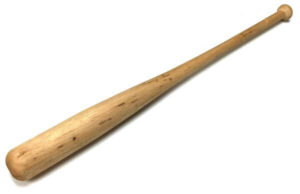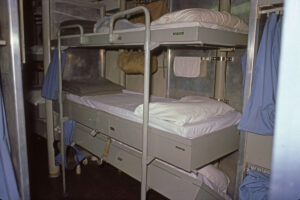Tag: Jonathan Coppe ’18
The Nail
by The Cowl Editor on October 26, 2017
Portfolio

by Jonathan Coppe ’18
“What about these?”
PJ was pointing to some rocks. The boys had gotten together to play baseball in Conor’s front yard—Conor had a very big front yard. But when Conor’s parents left to go shopping, Conor’s dad had locked the shed that had the baseballs, so now they had to improvise.
Ed went over and looked at the rocks. He picked one up. It seemed pretty round, and it was about the size of a baseball if you didn’t look too carefully.
“I guess they’ll do,” he said. “Okay. Sean get up to bat. PJ take shortstop.”
“Jeez, we know the positions, Ed…” Caleb said. So it was. Everyone got into position and the game started. The first two batters took first and then second. It was a three-person dugout, so everyone hoped that the bases wouldn’t get loaded. PJ heard once that cricket had fewer bases and he thought maybe that would work better for the numbers they had, but he wasn’t about to suggest that everyone learn a new game.
So anyway, they were standing there hoping Ed wasn’t about to give up another single when he pitched the biggest rock he had in a fastball straight down the middle. The outfield took a sharp breath. Crack! Bill hit a clean line drive. The rock soared clean past Ed and straight at PJ’s forehead.
The poor kid fell flat on his back, letting out a sharp cry of pain. Everyone ran over to him. He was lying with his palms over his face, but he moved his hand and they all saw blood. “Oh shit! Oh shit!”—Caleb never cursed so his choice of words belied a sense of panic.
Since it was Conor’s front yard, it was unanimously decided that he would run inside to get his parents’ first aid supplies and a couple bags of frozen peas. The first aid stuff was in his parents’ bathroom. Conor ran through the house and into their bedroom. He looked into the bathroom. The door was half open.
First he saw the feet. Bare, toes pointed upward, lying on the ground, visible from about the mid shin. There was no hair on them, and they were too big to belong to a kid.
“Mom?” Conor yelled.
No answer. The feet didn’t move, either. Conor looked around. He didn’t see anybody.
He knew his parents weren’t home; he saw them drive away. He took a few tentative steps toward the bathroom. He checked his back again. Nobody there—nobody creeping up on him. He nudged open the bathroom door.
It was a body, lying there, quite flat, palms down. It was pale. Conor stared. It looked about adult-sized, but the head was too big somehow, too long for the rest of the body. That’s what it seemed like anyway, but it was hard to tell because the face was covered by a cloth.
For some time, he just stood there, looking the monstrous thing up and down.
Conor noticed something else about the head, too. The cloth had a tall bump up toward the top of the head. It was a long, thin sort of bump, like the kind cartoon characters would get on TV when they got hit hard on the head.
Conor checked his back one more time. Still no one. He crept over to the body. It didn’t look like it was breathing.
He took the sheet off the face. He was too frightened to scream, to even make any sound at all. The face on the body was his face. It was his head. It was his body, too, actually, just bigger, adult-sized, but still shaped like a child’s body. And right in the middle of his forehead was a single long, thin nail, driven—as far as he could tell—about halfway in. Two thin lines of blood ran from the nail down the left side of his forehead and onto his hair. His eyes were wide open and stared straight up.
Conor just gaped. It was his body, it was his face. He didn’t want to particularly, but he touched it just to know it if was real; he grabbed its hand. It was cold.
“CONOR, HURRY UP!”
Conor jumped.
“Jeez, don’t freak out.” It was just Ed.
“What?” Conor was still trying to get his bearings. Didn’t Ed see the body? Conor turned back to the body to point it out to Ed and call him stupid for not seeing anything. But the body was gone.
“Whatever, where’s the first aid stuff?”
“Oh, uh…” Conor paused and stuttered, trying to break his mind away from the body that had just been there and now wasn’t. His body. “It’s right here.” And Ed took it from the cabinet, and they left the room.
My Soul
by The Cowl Editor on October 5, 2017
Poetry

by Jonathan Coppe ’18
I passed tonight beside some trash
Within the nooks and crannies of a midnight street,
Remains of a festivity since passed,
A joy once in this space but now moved on.
Is not this space so like my soul,
This sometime temple of a distant joy,
Now only a wasteland for litter?
Or rather a spectacle, once bright and sweet
That shone and drew the smiling eyes of all?
The spectacle now demolished, cleared away,
The mixed, neglected refuse forms a scene
Meant only for the tragic souls of this world,
To see and feed their rambling melancholy.
Was all this meant when that poet said,
“My soul is an empty carousel at sunset?”
Exit Strategies
by The Cowl Editor on September 21, 2017
Portfolio

by Jonathan Coppe ’18
Basel was tired of spending all his weekends drunk and depressed. He had resolved to do something about it.
It was midnight. The dock was misty, and the cold, damp air got underneath Basel’s clothes, right onto his skin. He shivered, cinching up his scarf. He thought he had arrived more or less at the time he had been told to, and he had brought only a moderately sized suitcase, as he had likewise been told, wherein were a few changes of clothes, some toiletries, a couple of books, and a Bible.
He had been given the Bible on his sixteenth birthday by his mother. He wasn’t sure he had ever opened it, almost certain he had never read from it. But it was the sort of thing that was supposed to help you to have a moral conversion, and he had resolved it would live faithfully on his nightstand.
If it has not been surmised, Basel had decided to go to sea, working as a crewman on a large commercial freighter, under the impression that this would be sufficient to transform his life. He would spend at least six months in this endeavor, perhaps longer, if it seemed right to him.
After about 15 minutes, Basel faintly perceived the outline of a ship not far from the pier. He had to squint to be sure, since the dock was bright with insomniac, bluish flood lighting on all sides. But a few minutes’ time were sufficient to verify his impression, and he soon knew that it was his very ship which was drifting into port. “Thank God,” he sighed.
Aboard the ship, he soon saw his quarters were cramped and windowless, about the size of a prison cell, if that. The walls were steel, painted a sort of tired shade of beige. He was to share the room with a bunkmate. He unpacked his clothes into a dresser but—alas—no nightstand. He decided he would leave his Bible atop the dresser.
About a week on, he started to get a handle on the work. He was one of only a few native English-speakers on board. Most of the crew was Scandinavian—Danish, he thought. They were iron-browed, leathery men, and they looked down on his newcomer’s ignorance and his sensitivity. The work was uninteresting and demanding. “Perhaps it is penance,” he thought. He judged this is what a religious person was supposed to believe.
The degree of isolation he felt from them did eventually cause him to begin reading his Bible, if perhaps partially out of boredom. The book did not interest him greatly, since he began with one of the letters of St. Paul, which are judged even by another New Testament author to be difficult to decipher.
About two months on, a slight friendship began to form between Basel and one of the older Scandinavian crewmen. (The other American crewmen avoided Basel out of fear his poor reputation would bring down their already tenuous standing amongst the Danes.) Basel had distinguished himself to the old man by spotting an oil container’s faulty sealing and preventing a spill. They had spoken briefly during a couple night shifts, and lately the old man had invited Basel to eat with him at meal times. Basel generally remained rather quiet, but he appreciated the almost fatherly connection he had found.
Aksel, as the man was called, clued Basel in to some of the finer social rules on board, which greatly improved Basel’s social standing amongst the crew. Aksel, in no need of greater wealth or reputation in his old age, often found additional work for Basel around the ship, which made Basel useful in both his own eyes and in the estimation of the swarthy Danes he so feared.
In spite of his slowly rising spirits, Basel felt some guilt for his disinterest in the sacred text he had brought on board. As the weeks rolled on, he felt more and more that the book was mocking him as it sat unopened on his dresser.
He asked Aksel, one evening when they were docked in Amsterdam, whether the old man had ever found religion. He replied that as a young man he had not cared for it, but the approach of death had placed it back on his mind.
“Do you think it’s worth it for a young man?”
“Why? Do you want it? Someone told me you keep a Bible on your dresser.”
“That’s true about the Bible. I don’t know what I want.”
“Why did come out to sea?”
“I was afraid I was becoming an alcoholic.”
The old man roared with laughter. “So you joined a lot of sailors? Religion may be worthwhile. I don’t know. But you want it like you want a diet. People lose weight, they stop dieting. You stop drinking, you make some friends maybe, and there goes your religion, too.”
The Bedroom Light: A Moment, in Two Pictures
by The Cowl Editor on August 31, 2017
Portfolio

by Jonathan Coppe, ’18
Portfolio Staff
Getting up for the graveyard shift is a bitch. Who wants to go to work at 10 at night? No, on second thought, it’s going to bed at dawn that’s the worst part. I hate lying down while the sun comes up and it only ever gets brighter. Well, bed at 6 a.m. was the worst part before I got my part-time stocking at the grocery. Now I mostly just want to sleep.
Ugh, where is the coffee scoop?? You know what, I can look for it later. I’ll just use a spoon.
Do you still get to call it the graveyard shift when you’re a stripper? I guess 10 p.m. to 5 a.m. is more like standard business hours. That’s kinda funny, isn’t it? We talk about the daytime shift like it’s weird.
And then the carafe is dirty, of course.
You know, it is weird. If you’re at a strip club at two in the afternoon—well, you’re a 2.0 GPA college student, a pervert sex-addict, or an actual bum. Or you’re a very wealthy businessman with an investor who’s a pervert sex-addict.
No businessmen around here, though. There isn’t anything out here. It’s lonely. Nothing happens. It makes me miss home.
The toast never comes out done the first time. Always have to put it back down again. I should get out the butter and jam.
No, I don’t really miss home; I just miss the city. I don’t miss home. The apartment just tastes like Mom’s ghost. And Dad’s been an ass ever since she died. What exactly is wrong with stripping, Dad? I bet you went to some clubs back in the day. Are you really worried about me? What’s the real concern? “Don’t do that, or else I’ll have to hate you.”
It’s 9:15?? Okay, I’ll come back for the toast. Better start the shower.
One day, I’ll write a book with rules for fathers. Number one, maybe: Don’t tell your daughter you could hate her. Or else she’ll have to hate you. Especially if you decide to tell her you might hate her after her mother’s funeral. Mom’s funeral, Dad.
Clothes are in the bedroom. Okay.
Whatever. I can’t hate him, really, though. I don’t know. Maybe I’ll go back there sometime. Maybe he’ll finally say he’s sorry. He always loved me before. I don’t know.
Oh, good, the water’s warm.
***
Will she be able to see me if I stand here? I’m behind a bush, so I don’t think so. No, no. It’s after sunset and it’s rural. And she’s inside, with the lights on. She won’t see me.
She starts at 10—she has to be leaving soon. I’ll leave before that, and she won’t see me as she leaves. Car headlights, those could do it.
Not in the kitchen. I thought she was just in the kitchen. Her hair was wet that night. Maybe she takes a shower before she goes in.
Or maybe I stay? No, no, she won’t listen if she catches me. I need to be the one to approach her. I think she stocks some days at the A&P. No, no, I can’t go up to her like that. “Hi, Julia, I, umm, saw you dancing the other night. I know you probably don’t want be recognized here, but…” Right. That’ll work.
Can’t go up to her in the club either. “Hey there, Amber. Heard your real name is Julia. Can I just say you’re beautiful? I came here for the first time last week and you were the first one I saw…” Oh damn it all. Can’t think of anything worthwhile, can I? She just, she has that pretty, soft way—mysterious almost. I can’t measure up if I’m forward like that. Maybe leave her a flower?
Maybe Jimmy will have a suggestion. He brought me to the club. Maybe he knows the tricks and secrets. He knew a woman could make you feel different, which I didn’t know. Maybe he knows how to talk to them.
Oh my God, she’s in a towel. Don’t close the blinds. Please don’t close the blinds.
